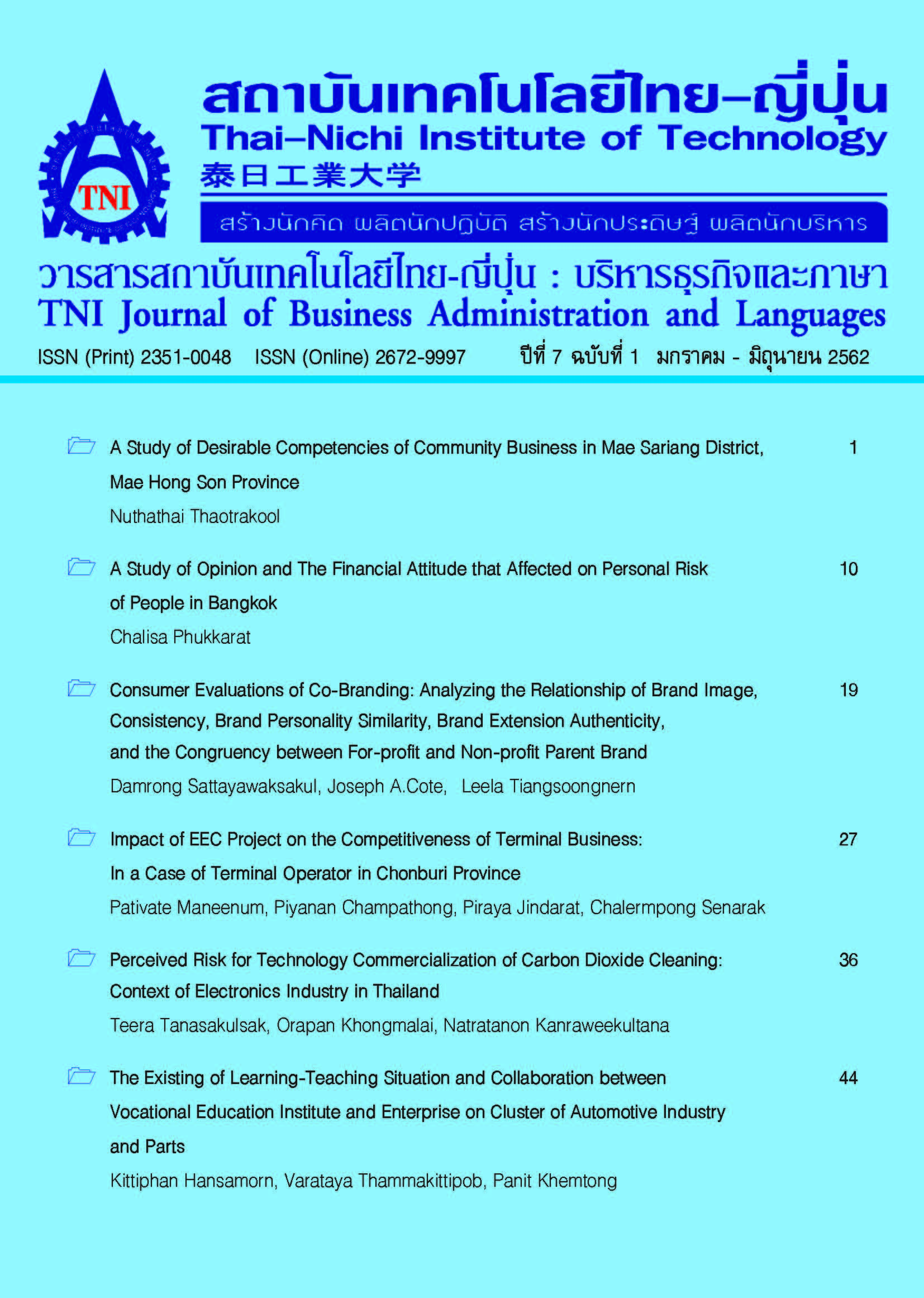The Relationship Study of Service Quality and Overall Satisfaction of Thai People, a Case Study of Airport Rail Link in Thailand
Main Article Content
Abstract
In an urbanization, the most convenient and fastest way to travel is a sky train and subway. Not only the convenience, also the customers expect from the service is the good service quality. The three main variables that affect the satisfaction of the Airport Rail Link service customers and can be used to predict overall satisfaction such as the empathy, understanding the customers, and the service tangible. The research objectives are to study the relationship between service quality factors and overall satisfaction from Thai passengers toward the Airport Rail Link service. It is used to develop the better quality of the Airport Rail Link service. It is a quantitative research by using 426 questionnaires by accidental random sampling. The sample size is calculated from Taro Yamane table. The research found that the behavior of the respondents emphasizes the importance of reliability, the concreteness and the quality of service which towards the satisfaction of using the service.
Article Details
Article Accepting Policy
The editorial board of Thai-Nichi Institute of Technology is pleased to receive articles from lecturers and experts in the fields of business administration, languages, engineering and technology written in Thai or English. The academic work submitted for publication must not be published in any other publication before and must not be under consideration of other journal submissions. Therefore, those interested in participating in the dissemination of work and knowledge can submit their article to the editorial board for further submission to the screening committee to consider publishing in the journal. The articles that can be published include solely research articles. Interested persons can prepare their articles by reviewing recommendations for article authors.
Copyright infringement is solely the responsibility of the author(s) of the article. Articles that have been published must be screened and reviewed for quality from qualified experts approved by the editorial board.
The text that appears within each article published in this research journal is a personal opinion of each author, nothing related to Thai-Nichi Institute of Technology, and other faculty members in the institution in any way. Responsibilities and accuracy for the content of each article are owned by each author. If there is any mistake, each author will be responsible for his/her own article(s).
The editorial board reserves the right not to bring any content, views or comments of articles in the Journal of Thai-Nichi Institute of Technology to publish before receiving permission from the authorized author(s) in writing. The published work is the copyright of the Journal of Thai-Nichi Institute of Technology.
References
C. Suppavatee, “Smart Tourism: Another Step of Elevating Tourism to be Modern,” (In Thai). ELEADER Magazine, No. 335, 2017.
“Airport Rail Link,” Tourism Authority of Thailand. (In Thai). [Online]. Available: https://thai.tourismthailand.org/Travel-and-Transport/Travel-around-Thailand/Transportation-Options/ Airport-Rail-Link. [Accessed: 1-Apr-2018]
“Airport Rail Link,” [Online]. Available: https://en.wikipedia.org/wiki/Airport_Rail_Link_(Bangkok). [Accessed: 1-Apr-2018]
A. Parasuraman, V. A. Zeithaml, and L. L. Berry, “SERVQUAL: A Multiple-Item Scale for Measuring Consumer Perceptions of Service Quality,” Journal of Retailing, Vol. 64, No. 1, pp.12 – 40, 1988.
Y. Jiang, and C. L. Wang, “The impact of affect on service quality and satisfaction: the moderation of service contexts,” Journal of Services Marketing, Vol. 20 No. 4, pp. 211 – 218, 2006.
A. Parasuraman, V. A. Zeithaml, & L. L. Berry, “Reassessment of Expectations as a Comparison Standard in Measuring Service Quality: Implications for Further Research,” The Journal of Marketing, Vol. 1, No.1, pp. 111 – 124, 1994.
P. T. Kotler and G. Armstrong, Principles of Marketing, 17th ed. Hoboken: Pearson, 2017.
S. Pongsathaporn, The secret of service. (In Thai). Bangkok: UBCL Books, 2008.
S. Serirat, Consumer Behaviour. (In Thai). Bangkok: Diamond In Business World, 2007.
S. Chaipoopirutana. “Cross-Culture Study of Western and Thai Subway's Passengers Perception, Overall Satisfaction and Consumer Behavior,” in Proceedings of the 2nd PSU Phuket Research Conference, 2010, Phuket, Thailand, January 26-29, 2009, pp. 78-82.
Y. Worasit, and A. Choonhachatrachai, "Factor of Service Quality and Passenger Behavior Effecting to Attitudes of Consumers in Bangkok Metropolitan," (In Thai). MUT Journal of Business Administration, Vol. 13, No. 1, pp. 24 – 42, 2016.
W. Lai, and C. Chen, “Behavioral intentions of public transit passengers – The roles of service quality, perceived value, satisfaction and involvement,” Transport Policy. Vol. 18, No. 2, pp. 318 – 325, 2011.
H. Khorshidi, S. Nikfalazar, and I. Gunawan, "Statistical process control application on service quality using SERVQUAL and QFD with a case study in trains’ services," The TQM Journal, Vol. 28, No. 2, pp. 195 – 215, 2016.


